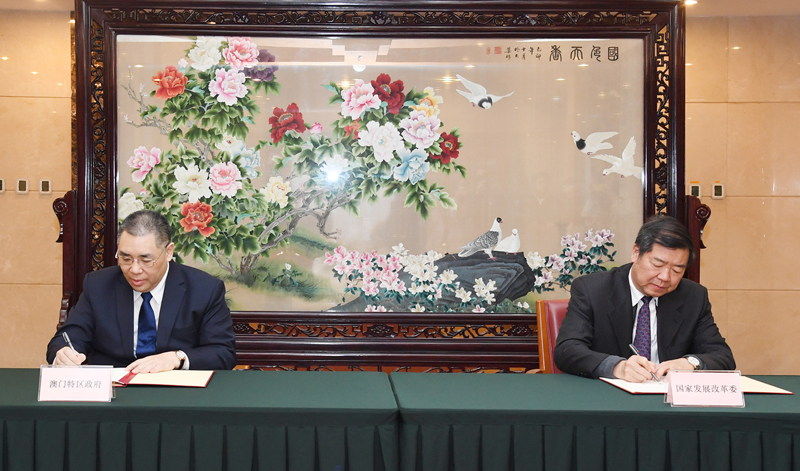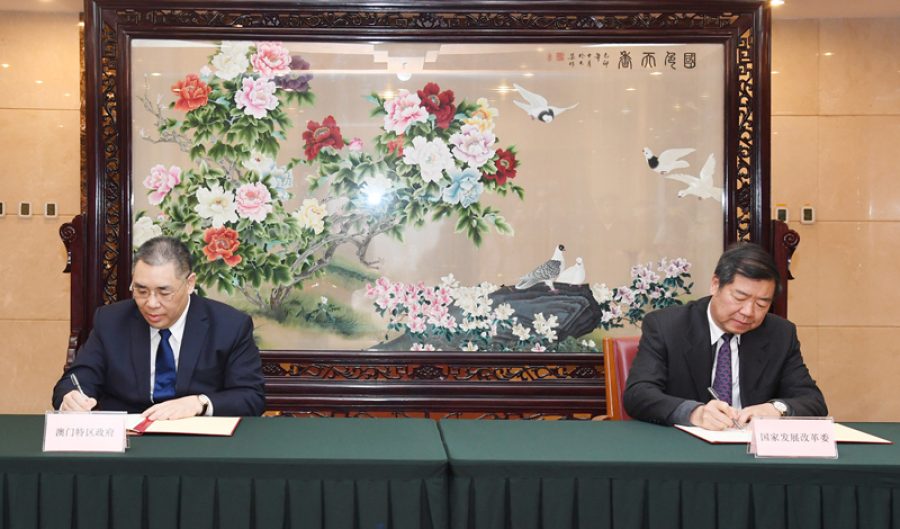The local government signed an agreement Thursday with the National Development and Reform Commission (NDRC) aimed at giving full play to Macau’s strengths in serving the Belt and Road Initiative (BRI), and generating fresh competitive advantages for the city and its economy, the Macau Government Information Bureau (GCS) said in a statement.
Chief Executive Fernando Chui Sai On and NDRC Chairman He Lifeng signed the deal during a ceremony in Beijing.
The agreement is officially known as the “Arrangement between the National Development and Reform Commission and the Government of the Macau Special Administrative Region (SAR) for Advancing Macau’s Full Participation in, and Contribution to the Belt and Road Initiative”.
Following the signing ceremony, the first joint conference under the new arrangement was held.
NDRC Deputy Chairman Ning Jizhe and Secretary for Administration and Justice Sonia Chan Hoi Fan each delivered a speech at the conference, which was chaired by NDRC Deputy Secretary General Su Wei, according to the GCS statement.
The arrangement has been formulated under the guiding principles outlined in the “Xi Jinping Thought on Socialism with Chinese Characteristics for a New Era”, the statement pointed out.
The arrangement covers matters including cooperation on financial services, economic and trade affairs, people-to-people exchanges, and cooperation between Macau and the other cities covered by the Guangdong-Hong Kong-Macau Greater Bay Area (GBA).
The arrangement aims to support Macau in various areas, such as in developing its financial services – “making use of the city’s inherent strengths” –to support the development of the BRI, so that Macau can transform itself into a financial services platform between China and Portuguese-speaking countries, in order to advance the internationalisation of the yuan, the statement said.
Under the arrangement, Macau is to become as a major transport hub and an important logistics centre of the “21st-Century Maritime Silk Road”, the statement said.
According to the statement, the arrangement is proof of the central government’s backing of Macau taking part in organisations dealing with regional trade, and in non-sovereign international professional bodies.
The arrangement is aimed at complementing Macau’s strategic roles as a world centre of tourism and leisure, and as a commercial and trade cooperation service platform between China and Portuguese-speaking countries (collectively known as the “Centre and Platform” policies). These roles complement the overall development of the BRI, the statement said.
High-level forums and international-level exhibitions themed on topics relating to the BRI will be held in Macau. The arrangement also seeks to help develop Macau’s role as a base for multicultural exchanges and cooperation with the goal of further promoting Chinese culture, the statement said.
Macau will also receive backing to develop as an incubator for cultivating “talents” proficient both in Chinese and Portuguese, according to the statement.
The local government officials outlined the progress of work relating to Macau’s contribution to the BRI during the conference where several ideas and policies designed to advance such effort were proposed, the statement said.
The NDRC and other central authorities will remain in close touch with the local government – including holding joint conferences on a regular basis – in order to implement policies outlined in the arrangement and to support Macau’s participation in, and contribution to, the BRI.
A number of central government ministries and other entities of the central government were represented at yesterday’s first joint conference, such as the Hong Kong and Macau Affairs Office of the State Council and the Foreign Ministry.
A separate statement quoted Chui as saying that the agreement signed yesterday paved a clear path for Macau’s contribution to the BRI and provided new impetus for the city’s economic development.
Chui said the local government would spare no effort, under the guidance of the central government, in advancing cooperation with Guangdong and Fujian – concerning joint contributions to the BRI – while also encouraging further involvement from Portuguese-speaking countries regarding the initiative.
The statement also quoted Chui as saying during the joint conference that the BRI provided Macau with opportunities to contribute its inherent strengths to the national effort, and to increase the city’s international standi






